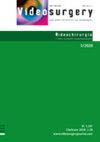Minimally invasive treatment of postoperative fistulas, leakages, and perforations of the upper gastrointestinal tract: a single-center observational study
IF 1.9
4区 医学
Q2 SURGERY
引用次数: 0
Abstract
IntroductionMost anastomotic leaks in the upper gastrointestinal (GI) tract can be treated with minimally invasive techniques dominated by endoluminal vacuum therapy (EVT) or stent implantation. Chronic leaks often require additional solutions, such as tissue adhesives or cellular growth stimulants.
Aim
To present a treatment strategy for postoperative leakage of upper GI anastomoses with noninvasive procedures.
Material and methods
A group of 19 patients treated in the period 2015–2023 with postoperative upper GI tract leakage was enrolled for endoscopic treatment. The indication for the therapy was anastomotic dehiscence not exceeding half of the circumference and the absence of severe septic complications. All patients were managed using endoscopic vacuum therapy (EVT) or a self-expanding stent while persistent fistulas were additionally treated with alternative methods.
Results
The EVT was successfully implemented in 13 cases, but 7 patients required alternative methods to achieve definitive healing. Self-expanding stent placement was performed in 6 patients; however, in 3 cases a periprosthetic leakage occurred. In this group, two patients had the stent removed and the third one died due to septic complications. Post-treatment stenosis was identified in 5 patients after EVT that required balloon dilation with acceptable resolution in all cases.
Conclusions
Early detected anastomotic dehiscence limited to half of the circumference most effectively responded to the noninvasive treatment. Nutritional support as well as complementary endoscopic solutions such as tissue adhesives, growth stimulants and hemostatic clips increase the percentage of complete healing.
上消化道术后瘘管、渗漏和穿孔的微创治疗:单中心观察研究
导言上消化道(GI)吻合口漏大多可通过以腔内真空治疗(EVT)或支架植入为主的微创技术进行治疗。材料和方法2015-2023年间,19名上消化道吻合口术后渗漏患者接受了内镜治疗。治疗指征为吻合口开裂不超过周长的一半,且无严重化脓性并发症。所有患者均采用内镜真空疗法(EVT)或自膨胀支架进行治疗,而顽固性瘘管则采用其他方法进行治疗。有 6 例患者进行了自膨胀支架置入术,但有 3 例发生了假体周围渗漏。在这组患者中,有两名患者被移除支架,第三名患者因化脓性并发症死亡。结论早期发现的吻合口开裂仅限于周径的一半,对无创治疗的反应最为有效。营养支持以及组织粘合剂、生长刺激剂和止血夹等辅助性内窥镜解决方案可提高完全愈合的比例。
本文章由计算机程序翻译,如有差异,请以英文原文为准。
求助全文
约1分钟内获得全文
求助全文
来源期刊
CiteScore
2.80
自引率
23.50%
发文量
48
审稿时长
12 weeks
期刊介绍:
Videosurgery and other miniinvasive techniques serves as a forum for exchange of multidisciplinary experiences in fields such as: surgery, gynaecology, urology, gastroenterology, neurosurgery, ENT surgery, cardiac surgery, anaesthesiology and radiology, as well as other branches of medicine dealing with miniinvasive techniques.

 求助内容:
求助内容: 应助结果提醒方式:
应助结果提醒方式:


